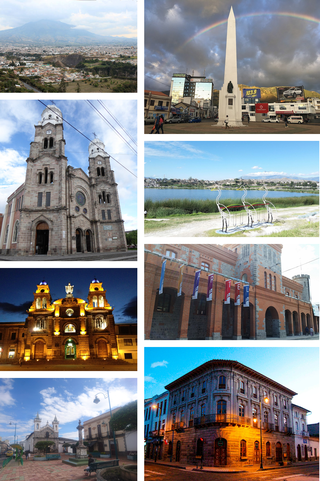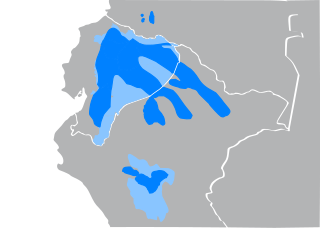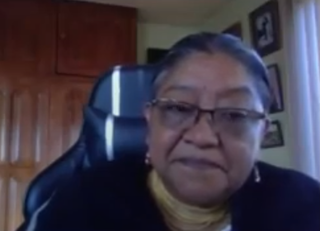
Demographic features of the population of Ecuador include population density, ethnicity, education level, health of the populace, economic status, religious affiliations and other aspects of the population.

Quechua, also called Runa simi in Southern Quechua, is an indigenous language family that originated in central Peru and thereafter spread to other countries of the Andes. Derived from a common ancestral "Proto-Quechua" language, it is today the most widely spoken pre-Columbian language family of the Americas, with the number of speakers estimated at 8–10 million speakers in 2004, and just under 7 million from the most recent census data available up to 2011. Approximately 13.9% of Peruvians speak a Quechua language.
Ecuador is a multicultural and multiethnic nation, with the majority of its population is descended from a mixture of both European and Amerindian ancestry. The other 10% of Ecuador's population originate east of the Atlantic Ocean, predominantly from Spain, Italy, Lebanon, France and Germany. Around the Esmeraldas and Chota regions, the African influence would be strong among the small population of Afro-Ecuadorians that account for no more than 10%. Close to 80% of Ecuadorians are Roman Catholic, although the indigenous population blend Christian beliefs with ancient indigenous customs. The racial makeup of Ecuador is 70% mestizo, 7% Amerindian, 12% White, and 11% Black.

Imbabura is a province located in the Andes of northern Ecuador. The capital is Ibarra. The people of the province speak Spanish, and a large portion of the population also speaks the Imbaburan Kichwa variety of the Quechua language.

Ibarra is a city in northern Ecuador and the capital of the Imbabura Province. It lies at the foot of the Imbabura Volcano and on the left bank of the Tahuando river. It is located about 70 kilometres (43 mi) northeast of Ecuador's capital Quito.

Quechua people, Quichua people or Kichwa people may refer to any of the Indigenous peoples of South America who speak the Quechua languages, which originated among the Indigenous people of Peru. Although most Quechua speakers are native to Peru, there are some significant populations in Ecuador, Bolivia, Chile, Colombia, and Argentina.
Cayambe is an agricultural service city in highland Ecuador. It lies at the foot of the Cayambe volcano. While the city is mainly peopled by mestizos, the surrounding rural population is primarily composed of indigenous people who are mainly involved in subsistence agriculture, dairy farming and procurement of lumber. It is the third-largest city in Pichincha Province.

Kichwa is a Quechuan language that includes all Quechua varieties of Ecuador and Colombia (Inga), as well as extensions into Peru. It has an estimated half million speakers.

Cuicocha is a 3 km (1.9 mi) wide caldera and crater lake at the foot of Cotacachi Volcano in the Cordillera Occidental of the Ecuadorian Andes.

Media Lengua, also known as Chaupi-shimiChaupi-lengua, Chaupi-Quichua, Quichuañol, Chapu-shimi or llanga-shimi, is a mixed language with Spanish vocabulary and Kichwa grammar, most conspicuously in its morphology. In terms of vocabulary, almost all lexemes (89%), including core vocabulary, are of Spanish origin and appear to conform to Kichwa phonotactics. Media Lengua is one of the few widely acknowledged examples of a "bilingual mixed language" in both the conventional and narrow linguistic sense because of its split between roots and suffixes. Such extreme and systematic borrowing is only rarely attested, and Media Lengua is not typically described as a variety of either Kichwa or Spanish. Arends et al., list two languages subsumed under the name Media Lengua: Salcedo Media Lengua and Media Lengua of Saraguro. The northern variety of Media Lengua, found in the province of Imbabura, is commonly referred to as Imbabura Media Lengua and more specifically, the dialect varieties within the province are known as Pijal Media Lengua and Angla Media Lengua.

The Latin American Faculty of Social Sciences is a graduate-only university and inter-governmental autonomous organization for Latin America dedicated to research, teaching and spreading of social sciences. Headquartered in Costa Rica, it has several campuses and centers spread across Latin America.

Amazonian Kichwas are a grouping of indigenous Kichwa peoples in the Ecuadorian Amazon, with minor groups across the borders of Colombia and Peru. Amazonian Kichwas consists of different ethnic peoples, including Napo Kichwa and Canelos Kichwa. There are approximately 419 organized communities of the Amazonian Kichwas. The basic socio-political unit is the ayllu. The ayllus in turn constitute territorial clans, based on common ancestry. Unlike other subgroups, the Napo Kichwa maintain less ethnic duality of acculturated natives or Christians.

Nina Pacari, born as María Estela Vega Conejo is a Kichwa politician, lawyer and indigenous leader from Ecuador.

The Otavalos are an indigenous people native to the Andean mountains of Imbabura Province in northern Ecuador. The Otavalos also inhabit the city of Otavalo in that province. Commerce and handcrafts are among the principal economic activities of the Otavalos, who enjoy a higher standard of living than most indigenous groups in Ecuador and many mestizos of their area.

Gabriela Alejandra Rivadeneira Burbano is an Ecuadorian politician. She was President of the National Assembly of Ecuador between May 2013 and May 2017. Previously she was Governor of Imbabura Province from 2011 to 2012.

María Blanca Chancoso Sánchez is an Ecuadorian educator and indigenous leader of the Otavalo people.
Ch'aska Anka Ninawaman is a Quechua-language poet, translator and lecturer of literature.

Pazmiño Arregui Mireya Katerine is an Ecuadorian politician representing the province of Bolivar in the National Assembly. She is a member of the Pachakutik Plurinational Unity Movement – New Country party who has been an independent.

Ana Beatriz "Betty" Tola Bermeo is an Ecuadorian politician and former minister. In June 2022 she was putting forward proposals for a feminist government in Ecuador.
















